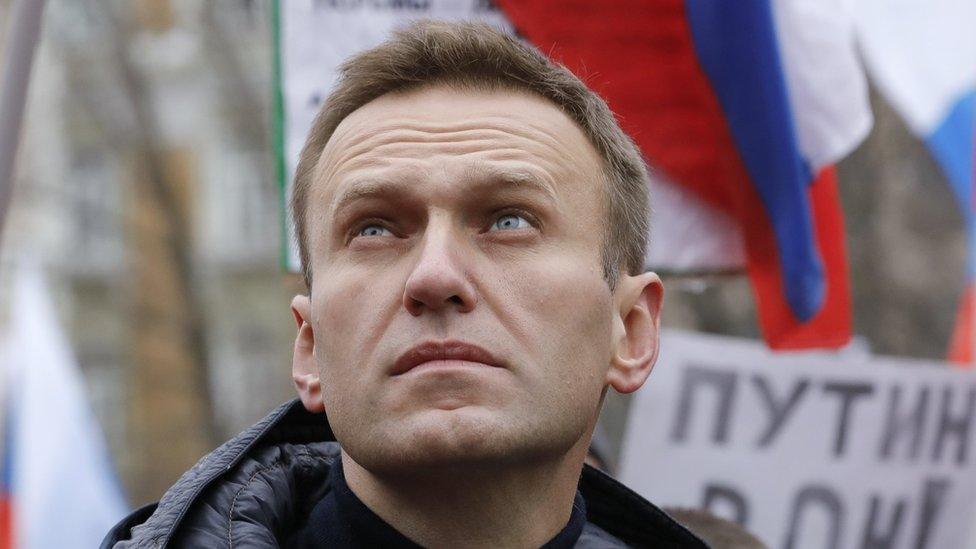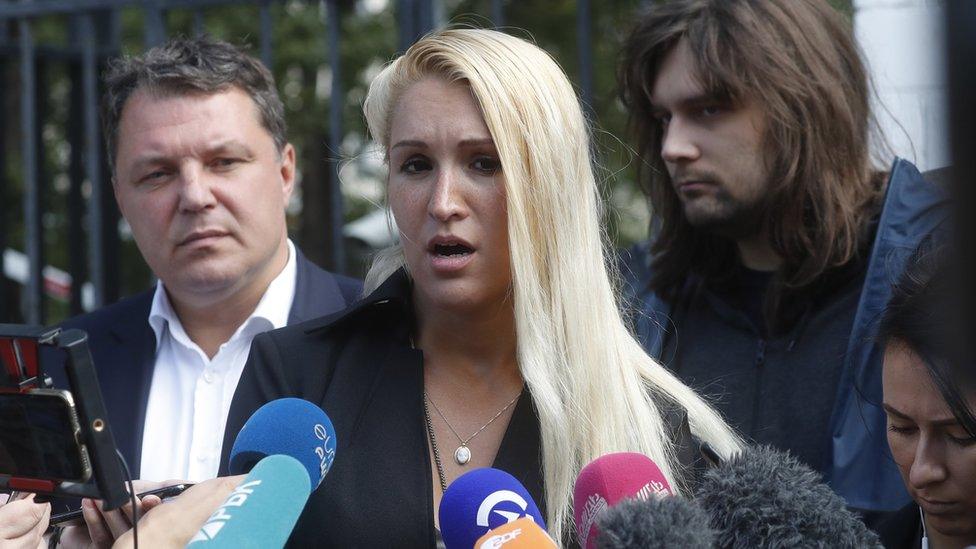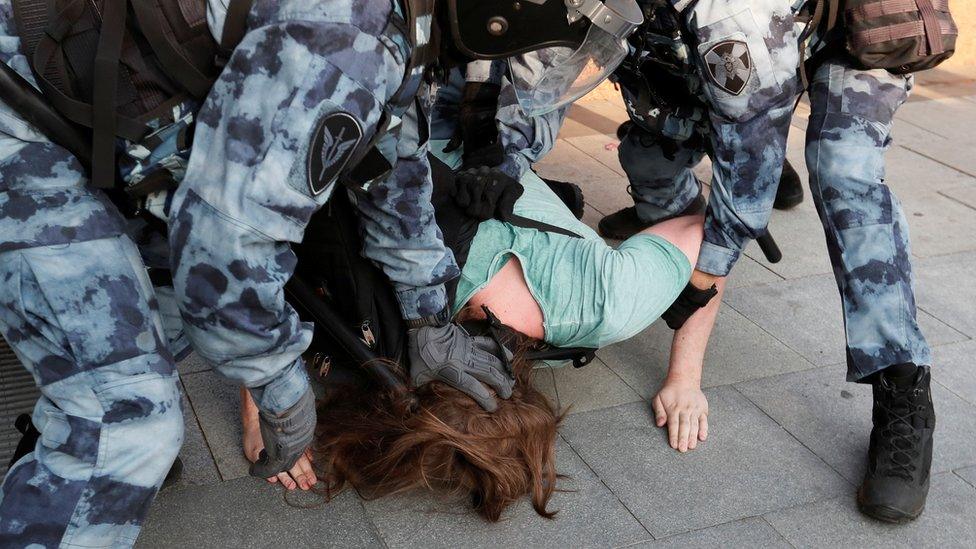Alexei Navalny discharged from hospital despite doctor's opposition
- Published

Alexei Navalny, pictured at a rally in memory of assassinated politician Boris Nemtsov, was detained last week
A doctor for Alexei Navalny, Russia's most prominent opposition figure, says he has been discharged from hospital.
Mr Navalny, who was detained last week, will now be transferred back to jail.
Initial reports suggested that he had suffered an acute allergic reaction, resulting in a swollen face, eye problems and rashes on his body.
His doctor said she opposed his discharge, saying he'd never suffered from allergies before and may have been exposed to "some toxic agent".
Before Mr Navalny was released from hospital, his medical team said they were able to gain access to him and had arranged for samples of his hair and T-shirt to be tested independently.
Police marched away detainees on the 27 July protest
Speaking to AFP, Mr Navalny's doctor Anastasia Vassilieva said he was "not allergic to anything".
"It was a toxic reaction to a chemical, it was definitely some chemical agent," she said. "It's absurd to call it an allergy."
She added that he "needs to be under close medical supervision", and should be allowed to call his relatives.

Anastasia Vassilieva, Mr Navalny's personal doctor, said it was "absurd" to put his condition down to an allergic reaction
Mr Navalny was jailed for 30 days last week after calling for unauthorised protests, which took place on Saturday.
Nearly 1,400 people were detained during the demonstrations against the exclusion of opposition candidates from local elections.
The European Union criticised the "disproportionate" use of force against the protesters, external, saying it undermined the "fundamental freedoms of expression, association and assembly".
Kateryna Yushchenko, the former Ukrainian first lady whose husband Viktor Yushchenko was poisoned 15 years ago, tweeted:
"This brings back horrific memories of September 2004. Our doctors also balked at diagnosing what happened to my husband as poison. And some doctors with security pasts tried to cover it up. Recommend Alexei get treatment in Europe ASAP."

'A thorn in the Kremlin's side'

Alexei Navalny is Russia's most prominent opposition activist - and one of President Putin's most vocal critics.
That's why news of a sudden illness makes headlines.
Especially if it's a sudden illness contracted in a Moscow jail.
There's been no confirmation that Mr Navalny was poisoned. But his doctors - and his supporters - are keen to know what sparked such sudden symptoms.
He is no stranger to health scares. Two years ago Mr Navalny was the victim of an assault. He suffered a chemical burn in his right eye after someone threw green-coloured antiseptic in his face.
He is a constant thorn in the Kremlin's side. The authorities know that, with President Putin's personal ratings falling, the charismatic anti-corruption activist has the ability to mobilise anti-Kremlin sentiment.
But it's too early to conclude that his current state of health is connected to his political views or activities.

Media reports said about 20 people, including journalists, were also detained after gathering outside the prison hospital on Sunday night where Mr Navalny was being treated.
Russian media report that most of the activists detained over the weekend have now been released.
However, about 150 were still in custody on Monday. They are facing judicial hearings and may be charged in connection with the unauthorised rally.
What do we know about Mr Navalny's condition?
While in prison over the weekend, Mr Navalny reportedly began suffering from acute swelling, discharge from his eye and rashes on his neck, back, chest and wrists.
His former campaign manager, Leonid Volkov, said he recalled having a similar reaction while serving a prison sentence in the same jail cell for breaking protest laws.
The hospital described Mr Navalny's condition as satisfactory.
Ms Vassilieva said earlier that none of the opposition figure's family or lawyers had been told his diagnosis.
In a Facebook post, Ms Vassilieva complained that she had been barred from visiting Mr Navalny, external. But based on what she saw of him through a door, she said he may have been injured by a "chemical substance from a third person".
She said that her suspicions were being fuelled by "certain officials... acting strangely".
"No one is looking for the cause [of his illness], doctors are denied access. There are lies all around," she wrote.
Who is Alexei Navalny?
The 43-year-old made his name in Russia as a grassroots anti-corruption campaigner.
He led the country's biggest street protests against President Putin in 2011 and has repeatedly been jailed, usually for his involvement in unauthorised demonstrations.
Mr Navalny suffered a serious chemical burn to his right eye in 2017 after he was assaulted with antiseptic dye.
He attempted to stand in last year's presidential race but was barred because of previous fraud convictions in a case he says was politically motivated.
What happened during the protests?
Thousands of Russians took to the streets last Saturday to demand fair elections. The demonstrations came after 30 opposition candidates were barred from standing in local races this September.
Officials said the candidates had failed to collect enough valid signatures to stand, but opposition groups argued that the barring was politically motivated.

Russian officials said nearly 1,400 people were detained in Saturday's protests
Mr Navalny helped to organise the demonstrations. Officials said they had arrested nearly 1,400 people - making it one of the biggest crackdowns in recent years.
Images from Saturday showed police in riot gear pushing crowds from the mayor's office in central Moscow.
A number of protesters could be seen bleeding, while at least two members of the security forces reportedly received eye injuries from pepper spray.